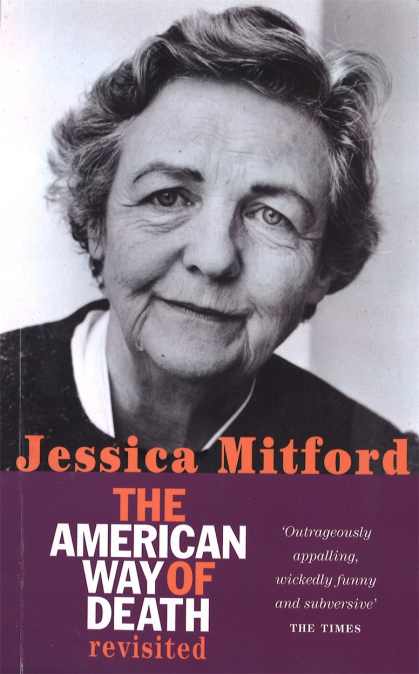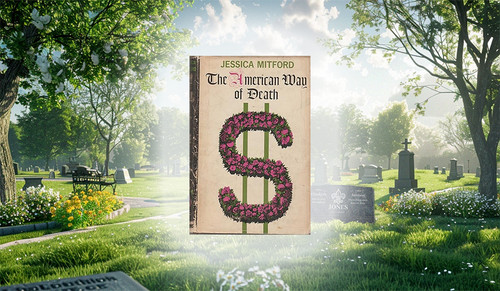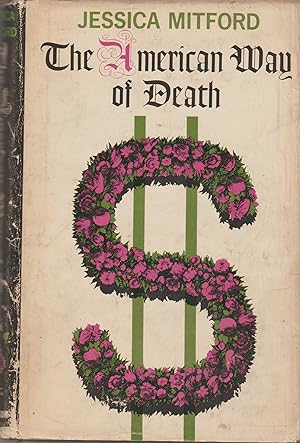The Book that Turned the American Funeral Industry on Its Head in the 60s
1st Apr 2024
Jessica Mitford penned a groundbreaking exposé, "The American Way of Death," which sent shockwaves through the funeral industry. The meticulously detailed book was published in 1963. In it, Mitford scrutinized the funeral industry practices in the United States, unveiling the exploitation and commercialization of death, and profoundly transforming public perception and industry practices. As a funeral industry veteran and a content creator specializing in this field, I will delve into the significant impact of Mitford’s work on the funeral industry, highlighting its implications, the ensuing changes, and how it continues to influence the sector today.
Mitford's husband, civil rights lawyer Robert Treuhaft, persuaded her to write an investigative article about the American funeral industry. Although her article on the subject, "Saint Peter Don't You Call Me," published in Frontier magazine, was not widely disseminated, it caught considerable attention when Mitford appeared on a local television broadcast with two industry representatives. Convinced of public interest, she wrote The American Way of Death. In the book Mitford harshly criticized the industry for using unscrupulous business practices to take advantage of grieving families.
The Revelations
Mitford’s investigation into the funeral industry unveiled several unsettling practices. She exposed how funeral directors often exploited grief-stricken families, pressuring them into purchasing expensive funeral packages and unnecessary services, thus commercializing a deeply personal and sorrowful experience. The book revealed the lack of pricing transparency, high markups on coffins and burial services, and the manipulation of cultural norms to upsell lavish funeral services as a measure of respect for the deceased. Her revelations stirred a national conversation about death care practices, consumer rights, and the need for regulation in the funeral industry.
Regulatory Reactions and Industry Reforms
The publication of “The American Way of Death” catalyzed significant regulatory scrutiny and led to reforms within the funeral industry. One of the most notable outcomes was the Federal Trade Commission’s (FTC) intervention. In response to the issues highlighted by Mitford, the FTC 1984 enacted the Funeral Rule, which aimed to protect consumers by requiring funeral homes to provide itemized price lists for services and goods like funeral caskets. This rule also allowed consumers to choose only the services and products they wanted, thus preventing the sales of unnecessary and costly funeral packages.
The Shift in Consumer Behavior and Industry Practices
Mitford’s book also empowered consumers by educating them about their rights and the inner workings of the funeral industry. This led to a shift in consumer behavior, with more individuals demanding transparency, seeking cost-effective funeral options, and considering alternatives to traditional burial practices, such as cremation or green burials. Consequently, the funeral industry had to adapt to these changing consumer preferences. Funeral homes began offering a wider range of options, including more affordable services, transparent pricing, and personalized funeral experiences that reflect the wishes of the deceased and their families.
While Jessica Mitford’s “The American Way of Death” significantly influenced the funeral industry and consumer rights, it is important to consider the criticisms of her work, particularly regarding her stance on funeral ceremonies and traditions. Critics argue that Mitford’s exposé while unveiling the exploitative practices within the funeral industry, may have overlooked the intrinsic value and benefits of funeral ceremonies and traditions in aiding survivors through their grieving process.
The Value of Funeral Traditions
Funeral traditions and ceremonies have played a pivotal role in human societies for millennia, serving as a conduit for expressing grief, commemorating the lives of the deceased, and facilitating the bereavement process. Critics of Mitford’s position highlight that these practices are not merely commercial transactions but are deeply rooted in cultural, spiritual, and emotional needs. They argue that funerals provide a structured way for survivors to process their loss, celebrate the life of their loved ones, and receive communal support.
Another point of criticism is the perceived blanket condemnation of the funeral industry's practices, potentially overshadowing the importance of personal choice and cultural sensitivity in funeral arrangements. Critics suggest that while advocating for consumer rights and transparency is vital, respecting and accommodating the diverse ways in which people choose to mourn and honor their deceased is equally important. This includes recognizing the value that many find in traditional funeral services, elaborate memorials, or other forms of ceremony that may indeed come at a financial cost but hold significant emotional and cultural importance for the bereaved.
The Balance Between Critique and Understanding

In light of these criticisms, it is essential to strike a balance between critique and understanding. Mitford’s work undoubtedly shed light on necessary reforms within the funeral industry. Still, a comprehensive discussion on funeral practices also requires acknowledging the complex interplay between commerce, culture, and emotional well-being. By fostering a dialogue that includes the benefits of funeral traditions alongside the need for fairness and transparency, we can better support individuals in making informed decisions that honor their loved ones in a meaningful way, without undue financial burden.
Jessica Mitford’s critical examination of the funeral industry brought about much-needed reform and awareness. However, revisiting the criticisms of her stance reminds us of the importance of preserving the emotional and cultural significance of funeral traditions in the bereavement process. While advocating for consumer protection, industry transparency, and affordability, it's crucial also to appreciate the diverse ways individuals and communities commemorate the deceased. This dual focus ensures that reform efforts enhance rather than diminish the capacity for funerals to provide solace and meaning to those grieving.
Mitford’s Legacy and Ongoing Influence
Jessica Mitford’s “The American Way of Death” remains a seminal work that continues to influence the funeral industry and consumer attitudes toward death care. Subsequent investigations and critiques of the funeral industry have inspired ongoing reforms and a more consumer-focused approach to funeral services. Mitford’s legacy is evident in the growing trend towards personalization, environmental sustainability in death care practices, and the ongoing push for transparency and consumer rights within the industry.
“The American Way of Death,” was a watershed moment for the funeral industry in the 1960s. It brought to light the exploitative practices of the industry, led to significant regulatory reforms, and changed the way Americans approach death and funeral services. Today, the funeral industry continues to evolve, influenced by Mitford’s legacy and the changing preferences of consumers who demand transparency, affordability, and personalization. As we continue to navigate the complexities of the funeral industry, Mitford’s work serves as a crucial reminder of the importance of consumer rights and the need for ongoing vigilance and reform in the face of exploitation.





